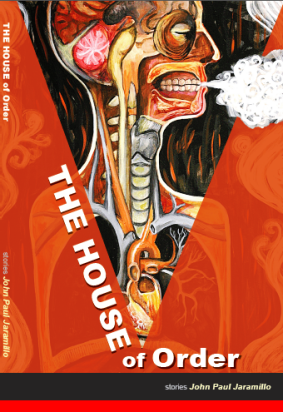Mayra Calvani's Blog, page 21
December 10, 2012
Interview with Donald Morris, author of Tax Cheating: Illegal - But Is It Immoral?

Donald Morris is a Professor of Accounting at the University of Illinois and the author of Opportunity: Optimizing Life's Chances (Prometheus Books, 2006--Opportunitybook.com), co-author of Accounting Desk Book (Commerce Clearing House, 2005-2011), and has published papers on tax, business ethics, investing, and business strategy. He has a PhD in Philosophy from Southern Illinois University and a Master's in Taxation from DePaul University in Chicago.
Morris is here today to talk about his latest book, Tax Cheating: Illegal--But Is It Immoral? which I had the opportunity to review this week.
Find out more about the book on Amazon or the author's website.
Thanks for this interview. What made you decide to write this book?
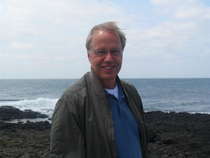 The goal of writing about the ethical dimensions of tax cheating grew out of my reaction to a public opinion poll I read in 1999. According to the poll, 87 percent of Americans believe that tax cheating is always wrong. That level of agreement among Americans led me to wonder what forces were at work—was it a high level of patriotism, a belief that the government employs its scarce resources wisely, or an acknowledgment of the value of the tangible and intangible benefits we receive in return for our tax dollars? I wondered how such a distasteful process as filling out a tax return and writing a check to the treasury could possibly strike such a powerful moral chord in that many people.
The goal of writing about the ethical dimensions of tax cheating grew out of my reaction to a public opinion poll I read in 1999. According to the poll, 87 percent of Americans believe that tax cheating is always wrong. That level of agreement among Americans led me to wonder what forces were at work—was it a high level of patriotism, a belief that the government employs its scarce resources wisely, or an acknowledgment of the value of the tangible and intangible benefits we receive in return for our tax dollars? I wondered how such a distasteful process as filling out a tax return and writing a check to the treasury could possibly strike such a powerful moral chord in that many people.
Who is your target audience?
Individuals interested in tax reform and a tax system that is more transparent and less open to the influence of lobbyists and special interests.
What is it about filling a tax form that strikes such a powerful moral chord in so many people?
I think people are very conscious of being cheated, whether it is being short-changed by a sales clerk, knowing politicians wasting tax funds, or believing that they are paying more taxes because someone else is not paying what the law requires. The belief that we are being cheated, either by other taxpayers or by the government strikes a powerful moral chord in many people.
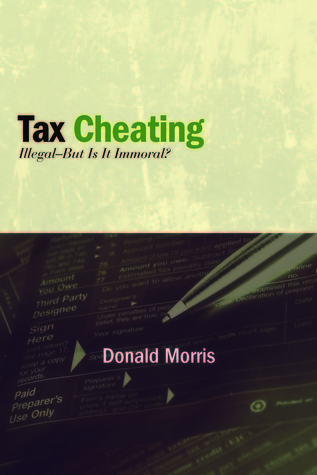 Why is there so much confusion about taxes?
Why is there so much confusion about taxes?
The income tax system was introduced 100 years ago and it applied to less than five percent of the population. The tax return was a simple one page form. The tax rates were modest, with the highest under ten percent. During the intervening 100 years, Congress has added exceptions and exemptions to make some aspect of the law more fair to some group of taxpayers. With each new Congress, new exceptions were added on top of the old with no attempt to coordinate the overall result. The end-product is a tax law that is complex and which results in most people hiring someone else to prepare their return or purchasing software to help them resolve uncertainty. In attempting to engineer exceptions benefitting increasingly narrow constituencies, Congress has unwittingly produced a law that makes it impossible for anyone to judge if they are paying their fair share or their share plus part of someone else’s.’
What is your definition of tax cheating and how does it differ from tax evasion?
Tax cheating is paying less tax than the rules require and benefiting as a result. Tax evasion is one component of tax cheating but the majority of tax cheating is the result either of not knowing or understanding the complex rules that comprise the tax code or of taking advantage of the tax code’s complexity and self-assessment model to manipulate the rules in one’s own favor. Four thousand individuals a year go to prison for tax evasion. But millions of individuals engage in some measure of tax cheating each year, many (or perhaps most) without even knowing they are breaking the law.
There are many reasons for the growing amount of tax cheating.
i. Low audit rate—for some, the chances of getting caught are too remote to consider—leading to the “tax audit lottery” mentality.
ii. Awareness that others are cheating and the perception that the system favors those who are well connected.
iii. Self-assessment model of reporting is an “honor system” for many and easily abused.
iv. The tax code’s construction has rendered it incapable of fostering a sense of moral duty to pay the tax; by design it does not appeal to our consciences.
v. Complexity of the tax laws leads to the inability of anyone to judge if they are paying their fair share of the tax burden.
vi. Respect for the law is eroded as taxpayers assume others are cheating and that favored classes of taxpayers are provided with tailored tax breaks, not available to all.
In your book, you state that “More than one writer has addressed the ethics of tax evasion, some defending occasions when evading taxes is the morally proper thing to do.” Could you please expand on this, as well as give a couple of examples of these ‘occasions’?
Several authors have written on the ethics of tax evasion. Their arguments are based on extreme circumstances such as the propriety of evading the tax regime of Hitler or other repressive states. The claim is that evading taxes in such situations is morally justified. Others have taken the position that all taxation is stealing by the government so that evading such government actions cannot be morally wrong.
Can the average person fill out a tax form easily or do you recommend hiring an accountant?
The average person whose income is from wages can fill out a tax return, though not always easily. But to ensure oneself that he or she is benefiting from the numerous deductions and credits that have been peppered throughout the tax law, hiring a knowledgeable tax professional is recommended for anyone owning a business and for many people with children in college, who are going through a divorce, or who own a home.
What would you like readers to get out from your book?
Readers should gain a better perspective on what kind of tax reform it would take to make the current system more transparent and make it possible for them to judge whether the tax they are required to pay is their fair share.
Where is your book available?
Amazon, Barnes and Noble
Is there anything else you’d like to add?
Educating yourself about why the tax code is so complex—the result of 100 years of adding special benefits and exceptions that benefit increasingly narrow constituencies—will give you a better understanding of the problem facing lawmakers and a clearer picture of why the system that created the current tax code cannot be expected to reform that system without significant campaign finance reform removing the incentives for adding to the tax code’s complexity each year.
My interview with the author originally appeared in Blogcritics.
December 2, 2012
John Paul Jaramillo Talks about his Short Story Collection, The House of Order
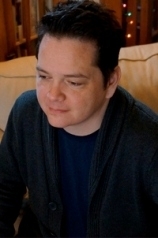 A native of Southern Colorado, John Paul Jaramillo now lives, writes and teaches in Springfield, Illinois. He has an MFA in creative writing from Oregon State University, and presently holds the position of Associate Professor of English at Lincoln Land Community College.
A native of Southern Colorado, John Paul Jaramillo now lives, writes and teaches in Springfield, Illinois. He has an MFA in creative writing from Oregon State University, and presently holds the position of Associate Professor of English at Lincoln Land Community College.His writing has been featured in Acentos Review, Copper Nickel Review, Antique Children Arts Journal, Fogged Clarity Arts Journal, Digest Magazine, Verdad Magazine, Polyphony Online, Paraphilia Magazine, Sleet Magazine and forthcoming in Palabra Magazine of Chicano and Latino Literary Art.
He's the author of the short story collection,The House of Order, published by Anaphora Literary Press.
About the cover...
"The artwork is from an amazing Illinois artist named Felicia Olin. Her work inspires me and this particular piece titled 'Breathe Out' caught my eye at an art showing at the University of Illinois Springfield. I’ve been told these stories are very raw and I hoped the artwork matched. I also liked the way composite stories could break down a family and also a man so that we might see a fuller understanding. A fuller dimension in the layers of storytelling and narration. I like the idea that narration of a story can give us the inside and outside view of something. As in Olin’s work I guess things aren’t as pretty on the inside of folks or in the inner-workings of the world. I’m all for more complication in fiction to match the complication that exists in what Amy Hempel calls 'the problem of being alive.' Hopefully when one reads the book they might see a fuller view of a man or character, or situation for that matter, they might otherwise ignore or become offended with."
About his writing style...
"I’ve always been more interested in the form of books rather than the meaning. Expressing rather than communicating. I try to teach that to my students. Content only matters as much as it is organized and structured on the page and I have studied literary minimalism so closely. Obsessed with it really. I’m attracted to the idea of doing more with less. That’s the failed poet in my I guess. I’ve always been inspired with the minimalism of Amy Hempel and Denis Johnson. The minimal form works best with stories about such weighted subject matter such as abusive fathers or delinquent parents. I’ve tried to steal an elliptical and bare bones style to match the laconic male family members."
About what makes a good story...
"I think I’m particularly interested in trouble. Folks getting in and out of trouble. The thing within folks that creates that trouble around them. Expecially Latino males. Tom Spanbauer describes his style as dangerous writing. And I’ve tried to steal that for my stories. I think finding the trouble and putting the reader in an uncomfortable position along with the characters creates the most interest for the reader. So that’s one. I also think the language needs to mean more to the writer than the reader. That comes from my study of poetry. Tracy Daugherty told his workshop members that language is a character’s skin. I like that idea. We have to get inside of our character utilizing more and more intimate language. I guess that’s when I started using more and more mixing and switching of English and Spanish in my stories. To match the intimate language of the old folks from Colorado that influenced me and that best represent me. So that’s trouble and language. I guess the story must also be affecting. And I guess I mean that stories need to be less plot-driven and more driven by emotion. The best stories that I return to again and again are stories that give less plot and storyline but through the deep use of language and care for the main character makes me feel the most. The work has to be character driven and affecting to create a true immersible experience to compete with films and television and more visual mediums."
What's next for John Paul Jaramillo...
"I’m working on a follow up to my first collection of stories. I’m tentatively calling the book Huérfanos named after the nearby county I grew up around and it is more of a traditional novel rather than literary minimalism styled collection of short stories. The criticisms of my shorter stories have been a complaint on the length of the stories. We don’t spend much time with characters and within a novel I can spend that time. I can give a fuller trajectory for the characters. I jump from generation to generation in the short work but I like the idea of adding even more dimension of time within a novel. I also like the idea of following more characters. I’m also interested in creative nonfiction essays about the steel mills and steel unions of Southern Colorado. I’m also interested in turning blog posts from my writing and teaching weblog I keep into fuller essays on the subject of so-called “Spanglish” and the use of intimate language within my written work. I’m interested in writing on the representation of Latinos in popular culture and in films as well as in literature."
——————————————————————————–
The House of Order, the first collection of composite stories by John Paul Jaramillo, presents a stark vision of American childhood and family, set in Southern Colorado and Northern New Mexico. Manito Ortiz sorts family truth from legend as broken as the steel industry and the rusting vehicles that line Spruce Street. The only access to his lost family’s story is his uncle, the unreliable Neto Ortiz.
November 28, 2012
Book Review: Serial Date, by D.V. Berkom
In an unexpected turn of fate, former assassin Leine Basso is offered a job working security in Los Angeles at a gigantic hit reality show called Serial Date–where beautiful young women get to date ex-cons posing as serial killers. Though L.A.brings her bad memories, Leine can’t just ignore $2,000 a week, especially when she needs the money.
Already there’s been one murder: one of the young women on the show was brutally mutilated and hidden in the prop closet, and it seems the killer will strike again. But is the killer one of the ex-cons or is he an outsider? Santiago Jensen, the handsome detective in charge of the case, isn’t so sure, even though all evidence seems to point out to one of the ‘bachelors.’
Soon, the police find a letter supposedly written by the killer, a letter that reveals a very focused agenda. Then, Leine’s daughter is kidnapped by someone claiming to be the killer. Leine hasn’t seen her in years because, unfortunately, her daughter doesn’t want her in her life–a fact that tortures Leine every day of her existence.
In order to find her daughter, Leine must use her skills as an assassin and come to terms with her own identity, something that secretly terrifies her. Soon, a grim picture emerges: is the killer someone from her past set on revenge?
I thoroughly enjoyed Serial Date. The author has a distinct style that is witty, smart, and darkly humorous. The prose is sharp and gritty. I love satires and this one was no exception. I especially enjoyed all the subtle, indirect criticism of television and reality shows. I kept chuckling as I read.
The story is told in multiple points of view separated by chapters, so there’s no distracting head switching. The pace is pretty quick with a fair share of exciting twists and turns. To add more flavor, Santiago and Leine provide a sprinkle of romance.
I have to admit, though, that the fact that Leine was a former assassin bothered me a lot in the beginning, even though the author stresses the fact that she killed criminals. I kept wondering if I was going to forgive her for that. Surprisingly, I did. Leine comes out as a very human character who is deeply sorry about her past and who wants to reconcile with her beloved daughter. This emotional subplot about her and her daughter really brought the story to a higher level for me.
Another thing I need to point out, just for those sensitive readers out there, is that there’s a lot of foul language.
In short, I highly recommend Serial Date to those who enjoy murder mysteries with a touch of satire.

November 26, 2012
Interview with Kaylin McFarren, author of Severed Threads

Please welcome my special guest, romantic suspense author Kaylin McFarren. I recently had the chance to read and review her latest novel, Severed Threads, and I have to say it is an entertaining, thrilling read. Kaylin was generous enough to take time out of her busy schedule to answer my questions about her book and her writing. I hope you'll enjoy the interview!
About the author
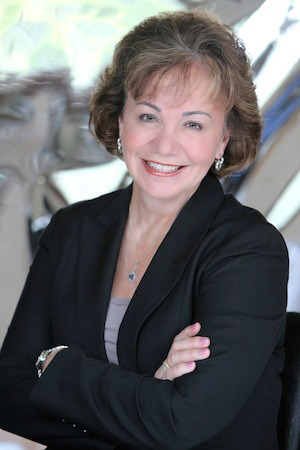 A native of California, Kaylin McFarren has traveled around the world and is now settled in Oregon.
A native of California, Kaylin McFarren has traveled around the world and is now settled in Oregon.As the director of a fine art gallery, she assisted in developing the careers of numerous visual artists who under her guidance gained recognition through promotional opportunities and in national publications. Eager to unleash and develop her own creativity, she has since channeled her energy toward writing novels. As a result, she has earned more than a dozen literary awards and was a 2008 finalist in the prestigious RWA® Golden Heart contest. She is a member of RWA, Rose City Romance Writers, and Willamette Writers.
Thanks for this interview, Kaylin! Do you consider yourself a born writer?
Definitely. Since the age of eight, I've loved to write stories and have been filled with an active imagination.
What compelled you to start writing professionally?
Like many authors, I was originally inspired to write my first novel after reading a great book and seeing an amazing movie. Mine happened to be Memoirs of a Geisha and The Notebook, which will always be my favourites.
Severed Threads is full of romance, suspense and danger. What was the most challenging aspect of writing this romantic thriller?
The most difficult task to writing a suspense story is to keep the action moving while revealing character traits and emotions along the way. Severed Threads contains an array of characters and each serve their purpose in revealing a twisting and turning plot that ultimately leads to a pleasant resolve. However, keeping the voices of each person unique also proved to be a challenge.
Tell us something about your hero and heroine that my readers won't be able to resist.
Chase Cohen is a handsome, womanizing, thrill-seeking treasure hunter who has found his greatest challenge and true love in Rachel Lyons. But she doesn't trust Chase for good reasons and won't be easy to win over.no matter how hard he tries.
What did you find most fascinating while researching underwater archaeology and ancient Chinese treasures?
I had no idea how much gold had been lost at sea. According to Greg Stemm, co-founder and co-chairman of Odyssey, there's billions of dollars scattered beneath the ocean. However, much of the ocean floor is unexplored and unmapped and global imaging shows crushing depths ranging up to six miles. And there could even be gold or diamond mines that far surpass what anyone on earth could imagine. Since trade included priceless collectibles and dishware from China as well as gold and silver, these were lost along with ships that sank during storms and battles hundreds of years ago and many will never be recovered.at least not in our lifetime.
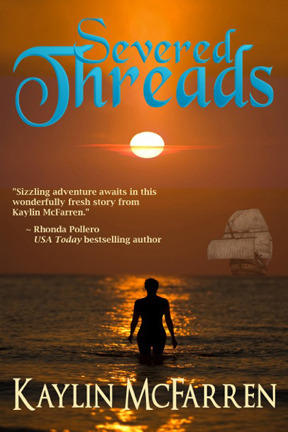 How long did it take you to write the novel and did you work from an outline?
How long did it take you to write the novel and did you work from an outline?It took me close to two years to write Severed Threads. This included the time needed to research details and edit my final manuscript. I typically create a synopsis and then write by the seat of my pants. I'm not big on storyboards and planning, as I'm too anxious to get my stories on paper.
What was the editing process like?
Although I tend to edit as I go, I eventually asked three published authors and two experienced readers to assist with my initial editing before hiring a professional editor to review my manuscript. After taking all of their advice into consideration, I fine-tuned my writing and sent it in for publication, hoping I'd done my best in creating a fast-paced, entertaining tale.
What advice would you give to first-time novelists who are just starting to market their books?
Spend a little extra time in researching your options. If you chose to approach a publishing house, be sure the agents you contact are experienced in your genre and have a great track record. If you decide to self-publish, be prepared to spend a little extra money and time in promoting your titles as well as yourself.
What's on the horizon for Kaylin McFarren?
I'm currently completing the second book in the Threads series - Buried Threads - and will be following this with a third - Banished Threads. I've enjoyed my characters so much in my first installment that I decided to take them on adventures around the world and have been urged to do so by readers who follow my stories.
Is there anything else you'd like to share with my readers?
Keep reading and if you enjoy the work created by an author, be sure to let them know. Your praise and support encourages every author to write!
Thanks, Kaylin!
Find out more about Severed Threads on Amazon.
View the original article on blogcritics.org
November 20, 2012
Book Review: Severed Threads, by Kaylin McFarren
Unexpectedly, however, things turn bad for Sam while he’s underwater: he suffers cardiac arrest for no apparent reason. Indeed, the circumstances surrounding his death appear more than a little mysterious.
Chase, who had loved him like a father, feels responsible and doesn’t know what to make of it. Did something malfunction or did something scare Sam down there? He'd been an experienced diver with over 20 years of experience under his belt. What had Chase missed? Sam was the only man Chase had allowed himself to trust. He and his daughter Rachel were the only two people he really cared for. But now all had changed: Sam was dead, and Rachel would forever blame him for his death.
Move four years forward. Rachel Lyons, Sam’s Daughter, is working at a grant foundation. All is pretty quiet and routine in her life…until she’s approached by a museum director asking for a grant to conduct another diving salvage operation, run by none other than Chase’s Trident Ventures.
Though Rachel has no intention of helping Chase, Chase is set on convincing her. Since the operation focuses on discovering the Wanli II, if they succeed, her father would receive his long overdue reward and the museum would fund a permanent exhibition to honor his memory.
Yet, Rachel is still hesitant. Then, a twist of fate puts Rachel's brother in danger, forcing her to change her mind about funding Chase's project. Chase is more than suspicious about her sudden change of heart, but he isn't about to say no to this opportunity which could help him leave his mark upon the world as a renowned treasure hunter.
Thus, she grants him the money and insists on joining the underwater expedition. Can she put aside pride and work with Chase on a daily basis?
Severed Threads is an engaging, entertaining read! I've always enjoyed stories about lost treasures and underwater archaeology and this one didn't disappoint. The hero and heroine are realistic and sympathetic and there's a sizzling chemistry between them. The plot is believable with a fair share of exciting twists and turns. I found the workings of a grant foundation and a diving salvage operation quite interesting and informative. Pacing is fairly quick with a nice balance of action, dialogue, description and the inner thoughts of the characters.
In short, Severed Threads is an exciting novel featuring danger in the high seas, romance, action and adventure, murder, and even a sprinkle of the paranormal for good measure. Recommended.

October 24, 2012
Interview with Beverly Stowe McClure, Author of LIFE ON HOLD
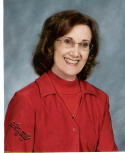 When Beverly was a child she hated to read. Even though her eighth-grade teacher sent her poem “Stars” to a high school anthology and it was published in Young America Sings she hated to write. In spite of her rocky relationship with books, she managed to graduate from high school then attended Midwestern State University, where she read more books than she could count. After four years, she graduated cum laude with, you guessed it, a teaching degree. And somewhere along the way, perhaps reading to her sons or reading great Newbery winners with her students, she discovered what she’d been missing: reading was fun. Now she reads most every day. She also writes stories and articles for children and teens.
When Beverly was a child she hated to read. Even though her eighth-grade teacher sent her poem “Stars” to a high school anthology and it was published in Young America Sings she hated to write. In spite of her rocky relationship with books, she managed to graduate from high school then attended Midwestern State University, where she read more books than she could count. After four years, she graduated cum laude with, you guessed it, a teaching degree. And somewhere along the way, perhaps reading to her sons or reading great Newbery winners with her students, she discovered what she’d been missing: reading was fun. Now she reads most every day. She also writes stories and articles for children and teens.Beverly lives in the country with her husband, two cats, and a variety of wild critters that stop by for a handout or just to peek in the door. Besides writing, she plays the piano, searches for her ancestors, and teaches a women’s Sunday school class. She also has the most beautiful grandchildren in the world.
Website: http://beverlystowemcclure.wordpress.com
Blog: http://beverlystowemcclure.blogspot.com
Facebook: http://facebook.com/beverlysmcclure
Twitter: http://twitter.com/beverlymcclure
Goodreads: http://www.goodreads.com/author/show/11462.Beverly_Stowe_McClure
Congratulations on yet another book release, Beverly! How do you keep yourself so productive?
Thank you, Mayra. It is fun to see a new book, after so many months of writing and editing, finally in the hands of readers. As for being productive, I think as an older writer, realizing I’m in those supposedly “golden years” motivates me to stay busy. Each hour of every day is precious to me. I hate to waste time. Maybe my years as a teacher helps too, since I’m used to a schedule. Even though I retired years ago, I still write out my plans for each day, not that I always stick to them, but I try. Also, my sons are grown and away, leaving me time for myself, which is rare when you have children at home. I do not see how writers with young kids and even teens manage to write.
I write at least two hours every morning except Saturday, which is catch up day, and Sunday, church day. Sometimes, my words are not worth keeping. Other times, they flow onto the screen and a story forms.
What was your inspiration for Life on Hold? Sounds like a compelling mystery.
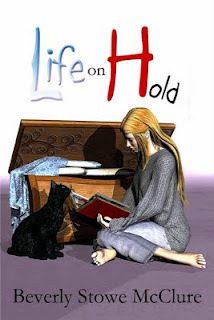 One day, I read an article in the local newspaper about a young couple that had a baby while they were still in high school. The girl’s parents made her give the child away. The teens eventually went their separate ways, married others, and had other children. Years later, a chance conversation between the boy or girl (I forget which one) and a friend mentioned an 18-year-old boy they knew that had been adopted when a baby. The article went on to tell how the former boyfriend and girlfriend, who no longer were married to their spouses, found each other again and decided to search for the son they’d given up. And, you guessed it, the teen mentioned was their son. They went on to have a wonderful relationship with him. I love stories with happy endings. I also imagine this story happens quite often.
One day, I read an article in the local newspaper about a young couple that had a baby while they were still in high school. The girl’s parents made her give the child away. The teens eventually went their separate ways, married others, and had other children. Years later, a chance conversation between the boy or girl (I forget which one) and a friend mentioned an 18-year-old boy they knew that had been adopted when a baby. The article went on to tell how the former boyfriend and girlfriend, who no longer were married to their spouses, found each other again and decided to search for the son they’d given up. And, you guessed it, the teen mentioned was their son. They went on to have a wonderful relationship with him. I love stories with happy endings. I also imagine this story happens quite often.Could you share with us what your process was like during the creation of this novel?
Most of the time, my stories start from something I read about, or sometimes a little voice speaks to me, or an event begs to be told. With Life on Hold, I basically started with the plot of a teen discovering her father really was her stepfather. At first, I wasn’t sure how the story would end or even how we’d get there. The characters carried me along, occasionally as confused as I was; other times knowing exactly where they were going. I’m pretty stubborn when it comes to my writing and try to write a little every day, as I mentioned earlier. My schedule is flexible, but mornings are my best writing time. It took me a bit over two years to write the story, including many revisions and then more edits with my great editor. Yes, I’m slow, but like the turtle I eventually reach my destination.
Did you hit any walls while writing the book? If yes, what did you do to overcome them?
Not walls exactly, but the final version had many changes from the original as I got to know the characters better. I keep each draft on the chance an earlier edition might have a scene I’d want to add back in. When a scene wasn’t working, I rewrote it in different ways to see what worked best. Many times the first thought was the best.
Did you celebrate when you typed ‘The End?’
I didn’t do anything special, but the words The End are two of my favorite words. They give me a sense of accomplishment, because many times in a story, I’ll wonder if it will ever end or if I should scrap the whole thing.
What do you want readers to get out of this book?
I’d like for children/teens who are adopted or those that are step children to realize that bringing a child into the world does not make a man a father. (Or a mother, a mother) Holding, rocking, and whispering gentle words to a child when she’s sick make a father. Attending her programs at school, helping her with spelling, taking her to the movies make a father. A father and mother show their love by actions: love, discipline when necessary, and always being there when the child has a crisis, whether big or small.
What do you enjoy most about being a children’s book author?
The most exciting thing about writing for children to me is when a child or teen says he/she likes my books. What greater reward can an author wish for?
Do you have any tips for aspiring authors?
You’ve heard it before, but it’s true. Hang in there. Never give up. I have enough “No thank you” letters to paper my whole writing room, but some of them also contain a word of encouragement. Cling to those comments. Use them to improve your story. Keep writing. Learn more. Attend conferences, Online ones if you can’t get to live ones. Keep writing. Yes, I’m repeating myself, but if you stop writing when times are tough, you’ll never be published. If you’re persistent, one day, you’ll succeed. Hint: Don’t expect to get rich, unless you write a blockbuster. Enjoy the writing. For me, the finished story is the reward.
What’s on the horizon?
My chapter book, Kate, Little Angel Sometimes (title will be changed) is scheduled for a May/June 2013 release from 4 RV Publishing. January 2013 is the release date of my Tween paranormal A Pirate, a Blockade Runner, and a Cat, MuseItUp Publishing. My orphan train story, Scattered to the Winds, is under contract with Twilight Times, and Guardian Angel has Weird Noises in the Night, no dates set yet.
Is there anything else you’d like to share with my readers?
Thanks to everyone who takes the time to read my thoughts. I hope they help you in some way. Visit me on my blogs. I love comments. If you read my books, please let me know what you think.
Thank you, Beverly!

September 26, 2012
Meet Trilingual Children's Author Nicole Weaver

Nicole Weaver is an award-winning children's author. Her love for languages and other cultures resulted in her writing three trilingual children's pictures books, Marie and Her Friend the Sea Turtle, My Sister Is My Best Friend and currently under contract My Brother Is My Best Friend. Nicole Weaver is a veteran French / Spanish high school teacher and adjunct professor of French at Arapahoe Community College in her hometown of Littleton , Colorado. Author , Nicole Weaver donates a large portion of her book proceeds to Mercy& Sharing . To learn more about Mercy & Sharing please visit:http://www.haitichildren.com/
Do you consider yourself a born writer?
No, I am not a born writer. I started writing when my two older children left home to attend college. I experienced some major depression. A friend of mine talked me into attending a local writer’s conference. I left the conference with an urgent need to start writing. I entered a poetry contest sponsored by my local library. I won first place and from there I branched out and wrote a children’s picture book. The therapeutic benefits from writing had me completely hooked.
Tell us about your recent release. What was your inspiration for it?
I got inspired to write My Sister is My Best Friend after I met my half sister for the first time in 2008. We immediately became best friends. My imagination took off. I began thinking about what it would have been like if I had grown up with her. I came up with a very positive story that portrays two twin sisters who get along and enjoy each other's company instead of being yet another typical story about sibling rivalry.
Tell us about your children's books.
My first book titled, Marie and Her Friend the Sea Turtle is based on true events of my childhood days in Port-au-Prince, Haiti. I lived with my father near the beach. Sea turtles came to shore to lay their eggs within walking distance from my home. I loved watching the mother turtles lay their eggs and later return to the sea. One unlucky turtle was stuck on the beach and much to my dismay; my father and uncles had plans for the poor turtle. In short, Marie and Her Friend the Sea Turtle is about what happened at the beach so many years ago.
My third book is very similar to My Sister is My Best Friend. My Brother is My Best Friend is currently under contract with Guardian Angel Publishing. It is a story about two twin brothers. A blogger left a message on my blog asking me to write a book about twin brothers, and that is how I came up with the idea to write the manuscript. Much to my delight, My Brother is My Best Friend came to be.
What was your favorite book as a child?
I loved The Curious George Series. I loved the pictures and reading them helped me learn how to read in English.
What are you working on now?
I am working on a manuscript, which is currently being critiqued. I think the manuscript should be ready for submission soon. I wrote a story about fraternal twins. I thought it would be great to complete the series. My first book is about two twin sisters, second book about twin boys and now the third about a boy/girl twin.
Where are your books available?
Amazon:
http://www.amazon.com/My-Sister-Best-...
My Publisher:
http://www.guardianangelpublishing.co...
Barnes & Noble:
http://www.barnesandnoble.com/s/My-si...
Do you have a website/blog where readers may learn more about you and your works?
Yes, readers can go here:
http://nicole-weaver.com
http://mysisterismybestfriend.blogspo...
http://marieandherfriendtheseaturtle....
Mayra , thank you for taking the time to interview me.
September 12, 2012
Interview with Jack L. Brody, author of The Moroni Deception

Please welcome my special guest, Jack L. Brody, author of the latest suspense thriller, The Moroni Deception . I had the opportunity to read it and you can find my review in Blogcritics. In this interview, Brody talks about the history behind the book and how difficult it was to dwell in Mormon controversy, among other things.
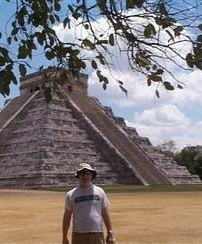 About the author:
About the author:Jack Brody is a writer, ex-military, and an avid traveler. After his Army stint and then deciding to pass on law school, he went to film school, wrote screenplays, and held a number of jobs which ran from everything to working for a newspaper for one day, to film production, to then going into real estate (with at least five others along the way). He's fascinated by history, politics, and architecture, all of which play a part in his novels (yes, he already has two more in the works). When not writing, he can often be found hiking with his two faithful dogs, occasionally breaking out the old BMW bike for a ride though the mountains, or playing volleyball or bar trivia with his friends. He divides his time between his home in the Southern Appalachians and wherever his passport will take him. After reading Jon Krakauer's bestselling "Under the Banner of Heaven," he was inspired to undertake a full year of research in preparation for the novel. Taking what he'd learned, along with a bit of imagination, the result was the conspiracy thriller, The Moroni Deception. Go to http://www.themoronideception.com/ for more information about the novel and to read the first chapters for free.
The Moroni Deception is your first novel. What made you decide to sit down and write it?
I'd written screenplays for a number of years, and had made several half-hearted attempts at a novel before, but not only was it was so different, but it was so much harder I found than writing a screenplay, so I had tended to give up pretty easily. The thing I ran into with screenplays, however, was the old Catch-22, that to sell a screenplay you have to have an agent, and to get an agent you have to have sold a screenplay. I won't go into a lot of details--for possible future legal actions which I may still take, but in my attempt to navigate around this agent obstacle, I sent my very best screenplay directly to two different director/producers. Both wound up--although it's not yet been proven in court-- "borrowing" very large and significant portions of this screenplay, and went on to make two different movies where I got to see a lot of my work up on the big screen, but without a penny in compensation.
The second film even went on to make over $100 million, which was sadly ironic, because I had always jokingly referred to that script as my "$100 million dollar screenplay." Those episodes really kind of took the wind out of my sails, and so I thought I the next time, maybe I need to to write a novel, and that hopefully it would be easier to find an agent, who could then represent my 5 other screenplays. My first, well, I hate to call it an inspiration, but what spurred me on, believe it or not, was an episode of "South Park" --"All About Mormons." Like a lot of people, I had never really given the religion much thought and had always just kind of thought of it as one of the lesser know Protestant branches of Christianity. After having my interest sparked, I then went on to read Jon Krakauer's Under The Banner of Heaven. With all the sordid history, and some, what I found to be, rather odd beliefs and practices, I knew, there was a lot of potential there for a novel.
I found the history behind the story fascinating. Is the prophecy mentioned in the novel true?
I did, well, I won't say "tons," but literally, pounds of research, from all the books I went through, notes that I took, and reams that I printed off from my internet research. While I had some idea in the beginning of what my story would be--which at the time, started out having to do with a rogue FBI agent who was investigating the murder of his Mormon girlfriend who had broken away from one of the LDS's radical fundamentalist offshoots. As you can see after reading it, it's changed quite a bit from that. I then probably took close to a year of doing nothing but researching and taking notes, mostly of what seemed like fascinating items to further explore and perhaps later work into the story. As far as "The White Horse Prophecy" goes, I wish I could take credit, but Joseph Smith supposedly first came up with that in the 1840's. There's actually a pretty good Wikipedia entry on the prophecy that gives a basic explanation. Mr. Romney has mostly dodged the question when asked about it, but I think back when he was running the first time, he said something along the lines that he considered the Prophecy to be a matter of "speculation and discussion by church members" and "not official church doctrine."
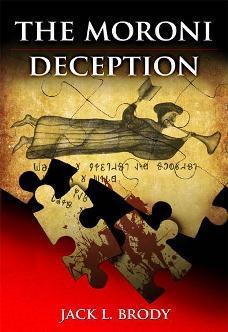 The novel deals with a negative aspect of religion, especially the Mormon religion. Was it difficult to deal with this aspect of the novel while working on it?
The novel deals with a negative aspect of religion, especially the Mormon religion. Was it difficult to deal with this aspect of the novel while working on it?Definitely, because I never wanted to turn it into a screed against the religion, and I tried to say some positive things that I could find whenever appropriate in the story. I did, though, want to work in as many true beliefs and historical facts as I could and let the reader make up his or her own mind. Like Michael Chenault, the main character, as well as the writers of our Constitution, I firmly believe that everybody has the right to believe in, and practice their religion in whatever way they see fit. But on the other hand, if say, Tom Cruise, a well-known practicing Scientologist, was to run for President, I would have to take his religion and beliefs into account before I went into the voting booth.
How long did it take you to write it?
If I could condense all the time I spent, doing both the research and the writing, it would probably be about 2 and a half years. However, and unfortunately for me , that's not the way things work, especially when we're not only living out our lives, but trying to put bread on the table with our day job. So the true time it took stretched out to almost 5 and a half years. I started it more than a year prior to the election of 2008, which is how I remember.
Are you a disciplined writer?
In that, unlike most people, I wrote and completed a novel, yes. But when compared to other writers, definitely not. When I read about how a guy like Dan Brown gets up every morning at 4:30 or some ridiculous hour, does an hour of exercise, and then sits down to write for 4-5 straight hours, or 10-15 full pages, and I'm both impressed and amazed. My writing time has always generally been limited by how much energy--both physical and creative--that I had left at the end of a working day. I often found myself not beginning my writing until 11 at night, and then writing until 1 or sometimes 2 AM. And that, again, was not every night. I also for about a year, had a very real case of "writer's block" where no matter what I did or how hard I tried, I couldn't get anything substantial down on the page. I even went to a hypnotist, which didn't do a lot, and I almost gave up. Also during this time period, I had to deal with a heart attack at a relatively early age, which came completely out of the blue, and then after that, the year and a half long battle a best friend of mine had to endure in his losing fight with cancer.
Did you plot in advance? If yes, tell us about your plotting process.
Well, as I mentioned earlier, I started out with a completely different story. I don't even quite remember where along the way my protagonist turned into an investigative journalist, other than that I thought I wanted to create a character who solved his problems more with his brains than with what he was packing, which seemed to be so often the case with a lot of adventure/thriller protagonists I was reading at the time. With The Moroni Deception, which I think is fairly intricately plotted, a lot of the little details that I think made it that much better, came out along the way. I, of course had a general plot outline in my head, and then down on paper. And then when something else would pop into my head, I would see first if it worked, second, if it actually made the story better, and then if it would work into the overall conspiracy. The lead conspirators/villains I didn't settle on until probably two thirds of the way through that I was working on the book. But when I finally did settle on this person or persons who shall remain nameless, that's when I then went back and made little subtle changes starting from the beginning.
What reaction do you think or hope your story will have on the general reader? Do you think it'll create a controversy the way The DaVinci Code did?
Well, the reaction I've gotten so far from just about every reader I've spoken with, or heard from either by email or through their reviews, is that The Moroni Deception is a fast, fun, very topical read, especially with the current election going on. I guess I should mention that in addition to exploring the strange but true history of the LDS (Mormon) Church, the protagonist, Michael Chenault, is investigating the background of a candidate running for President, who is a Mormon Senator from Utah, who it appears will say or do just about anything to get elected. Comparisons have obviously been drawn to Gov. Romney, and I've even had the timing of the release questioned. But I really did just finally finish writing in mid July, and I'm pretty sure I had no idea five and a half years ago that Mr. Romney would be in the position to be our next President come this November. As far as controversy, I can imagine some old school LDS members maybe not being too happy with some of what is revealed, but I'm not making any of it up--like the White Horse Prophecy, or the secret brotherhood of vigilant assassins known as the Danites, and some of their beliefs, like for instance, how any man can become a god and one day live on his own planet.
Where is your book available?
With a brief bit of explanation, because it took me so long to finish the book, I realized that if I went the traditional route of trying to find an agent, and then a publisher, and then have the publisher finally release the book, it could take up to another 2 to 3 years. I thought the timing was right, with the current election and all the interest there has been in the Mormon religion over the last several years, as well as the fact that electronically delivered books appear to be the wave of the future, to just release it initially for Kindles and Nooks and the like. And then, who knows, hopefully, maybe a publisher might want to step in and release it in hardcopy if there appeared to be enough interest. So with that said, right now The Moroni Deception is available from Amazon for Kindles, at Barnes & Noble for their Nook, at the iBookstore for Ipad, as well as for Kobo, Copia, and soon supposedly for the Sony reader, as well at Gardners Books, Baker & Taylor, and e-BookPie.
Anything else you'd like to tell my readers?
I guess just that if you're a fan of thrillers like The Girl With The Dragon Tattooor The Da Vinci Code, or you're one of those readers who likes to learn a little something along the way as you're being entertained, then I think you're really going enjoy my book. As there is some sex, and quite a bit of violence, it may not be everyone's cup of tea, and despite the fact that most 12-year-olds probably know more about life than I did when I was 20, I still wouldn't recommend it for anybody under 17. Also, I wanted to thank you for the great questions.
Thank you for the great interview, Jack, and best of luck with your book!
My interview originally appeared in Blogcritics, http://blogcritics.org/books/article/holdworking-div-tags-interview-with-jack/
September 11, 2012
The DaVinci Code Meets The Girl with the Dragon Tattoo

Jack L. Brody’s The Moroni Deception is an exciting page-turner in the tradition of The DaVinci Code, one that will be relished by fans of suspense thrillers.
The presidential election is just around the corner and it looks as though charismatic Republican candidate and Utah senator Brockston Ratchford is going to win. The fact that his wife has been brutally murdered and his daughter kidnapped has only gained him public sympathy.
However, his wife isn’t the only one whose throat has been cut from ear to ear and whose forehead has been marked with strange symbols. A retired history professor by the name of Martin Koplanski has suffered the same fate, and the fact that he’s the author of a book that apparently doesn’t sit well with the powers that be in the Mormon Church doesn’t look like a coincidence.
New York Times journalist Chenault begins working on the story. With the help of Rachel Potter, a fledgling reporter for the The Salt Lake Tribune, he sets out to investigate the murders. Soon, a dark grim history begins to emerge, one of ancient artifacts, secret societies, and a mysterious prophecy that points to none other than Senator Ratchford.
Who, in fact, is The Prophet? Who is meant to be The Great Restorer? As the clock ticks and the presidential election approaches, the bodies pile up.
I enjoyed this novel immensely. The Moroni Deception is a hell of a ride. The pace is quick, the characters compelling, the stakes high. I really liked Chenault. He’s smart and sympathetic and has a good heart. I especially like that he’s not one of those tortured journalist heroes with a bitter past and prone to drinking. That was refreshing. The ending is surprising and satisfying.
The Moroni Deception is a controversial novel in the same way as The DaVinci Code is. So if you enjoy thrillers with religious and historical undertones, you’ll get a kick out of this one.
August 20, 2012
A Conversation with Dominick Domingo, author of the YA Fantasy, The Nameless Prince
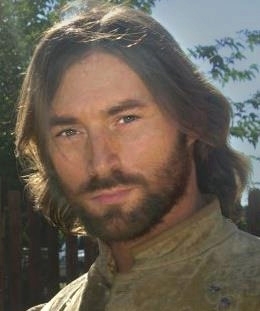 Dominick Domingo is a veteran Animation Artist (Lion King, Pocahontas, Hunchback, Tarzan, Fantasia) who's illustrated YA books for Penguin, Random House, Lowell House, Disney Publishing, Hyperion Books, and Harcourt. Developing original screenplays as a filmmaker led to a growing writing resume. To capitalize on it, Dominick recently penned a collection of Narrative Nonfictionessays titled "Jesus Shoes," two of which have been included in anthologies. One of the essays, 'L'Epiphanie,' was awarded the 2011 Solas award in the humor category for 'Best Travel Writing.' The Nameless Prince represents Dominick's foray into Young Adult urban fantasy. He'd be happy to retire as a full-time author. He lives in the Silver Lake neighborhood of L.A., surrounded by hipsters.
Dominick Domingo is a veteran Animation Artist (Lion King, Pocahontas, Hunchback, Tarzan, Fantasia) who's illustrated YA books for Penguin, Random House, Lowell House, Disney Publishing, Hyperion Books, and Harcourt. Developing original screenplays as a filmmaker led to a growing writing resume. To capitalize on it, Dominick recently penned a collection of Narrative Nonfictionessays titled "Jesus Shoes," two of which have been included in anthologies. One of the essays, 'L'Epiphanie,' was awarded the 2011 Solas award in the humor category for 'Best Travel Writing.' The Nameless Prince represents Dominick's foray into Young Adult urban fantasy. He'd be happy to retire as a full-time author. He lives in the Silver Lake neighborhood of L.A., surrounded by hipsters.Thank you for this interview, Dominick! You’re an illustrator and also a writer. How did both come about?
Like many artists/creatives, I have dabbled in various mediums of expression. I took my first oil painting class at seven. I got my first typewriter for Christmas at nine or so. Though I chose to get my degree in Illustration, I continued writing. I graduated Art Center and immediately began working at Disney on films such as Lion King, Pocahontas, Hunchback, Tarzan, and Fantasia, writing for pleasure all the while. I became involved in Middle Grade and Young Adult books as an illustrator by working with all the majors- Putnam, Random House, Lowell House, Harcourt, Penguin. Only after leaving Disney to make my own live-action films, did I stumble into a writing resume by acquiring several ‘original screenplay’ credits for imdb, sag films that found distribution. I decided to capitalize on that momentum and indulge my lifelong love of writing. Around that time, ( perhaps sensing my own mortality ) I began penning a collection of narrative nonfiction essays titled ‘Jesus Shoes.’ One of them won the Solas award for best travel writing in the humor category. Two were included in anthologies. ‘The Nameless Prince’ is my foray into Young Adult. I hope to retire as a writer. MUCH more relaxing to sit in coffee shops pecking away on my laptop than tearing my hair out on the set!
The Nameless Prince is an interesting title. How did you come up with it?
The novel is basically a parable for overcoming disillusionment and returning to innocence- a classic hero’s journey. When Seth arrives in the alternate realm, Interia, its residents immediately deem him the ‘Nameless Prince’ of prophecy, sent to save them from peril. On an odyssey of riddles and self-discovery Seth must prove himself the true Nameless Prince by symbolically discovering his own name. I don’t remember when exactly, but the title of the book created itself sometime while developing the mythology of the Interior. Their sacred text became the ‘Unfinished Story,’ and the savior of prophecy became ‘The Nameless Prince.’ I wanted a poetic simplicity, but more importantly the ring of truth, in the naming conventions. The title is meant to resonate with the undiscovered greatness within all of us.
Your novel seems to aim at a wide range of readers, from middle graders to adults. Can you talk a bit about this aspect of your novel?
The truth is, I’ve written in many genres. This is my debut novel, and it just happens to be YA. The concept was inspired, and it just demanded certain things, including a protagonist on the cusp of adolescence. I wasn’t thinking necessarily about conforming to the traditions of any one genre, or of marketing limitations with regard to readership. I just wanted to write a good story. I will say, however, that I’d carried a long-standing desire to write a ‘through the rabbit hole’ fairy tale, based on the hero’s journey. I’d always loved stories in which the protagonist (usually a loner) encounters a mythological creature in an unexpected place, and follows it to an alternate realm through some kind of portal. I grew up on C.S. Lewis and J.R.R. Tolkein, among others, and found myself returning to the worlds they created over and over again, as an escape. I like the idea of offering this solace to young readers- a place to go that makes the tough journey of adolescence a bit easier.
 In the writing of the novel I discovered that the simple, archetypal narrative held as much or more poignancy for adults. To put it in very good company, I liken its universality to that of ‘The Alchemist.’ There are many stories that I believe speak to people differently depending upon their station in life, and which may even take on new meaning when re-read as an adult with more perspective. This is my hope for ‘The Nameless Prince.’
In the writing of the novel I discovered that the simple, archetypal narrative held as much or more poignancy for adults. To put it in very good company, I liken its universality to that of ‘The Alchemist.’ There are many stories that I believe speak to people differently depending upon their station in life, and which may even take on new meaning when re-read as an adult with more perspective. This is my hope for ‘The Nameless Prince.’What themes do you explore in the novel?
As I said earlier, the main theme is that of overcoming disillusionment through forgiveness. This may sound a bit clinical; the more familiar template is ‘preserving innocence.’
Other sub-themes: the truth will set you free
The power of faith
All change comes from visualization- begins in the imagination
Family is where you make it
Trusting ones intuition
Discovering ones true self only by being tested
There are many more- but I am actually more interested in what readers walk away with- what it says to them! I believe the symbology is open to projection and says different things to different people!
Are you a disciplined writer? What is a typical day like for you and how do you balance writing and illustrating?
It is not an effort for me to be disciplined in my writing; I so enjoy it that I can hardly wait to get back to it. Especially when I am steeped in a world I’ve created or engaged with my characters, which are often like children! And I suppose I am a bit of a workaholic. But the main thing that makes me disciplined in any creative pursuit is my understanding of the creative process and its various stages. I have easy access to my process ( no stringent conditions necessary; it is not ‘fragile’ ) so I can easily relegate my writing or illustrating to 9-5 hours. For those struggling with access to their own process, I recommend studying the various models of creativity and understanding the value of each stage.
I’ve been asked what environment I create or seek in order to write. Believe it or not, I prefer the hustle and bustle of coffee houses. Access to caffeinated beverages and humanity if I like. It’s hard for me to roll out of bed and walk across the room to create. I need a change of scenery, to get my blood pumping. And did I mention caffeine?
How would you describe your creative process when you write? How would you compare it to illustrating?
Believe it or not, they are similar. As alluded to above, the steps in the creative process, the way I understand and experience them, are the same whether one is writing a symphony or building a rocket. It’s about recognizing them.
Germinating on a problem to be solved is the same whether that problem is the perfect conceptual image to represent a text in illustrative form, or whether that problem is a story you wish to tell. After germinating, the burst of inspiration is the same and quickly, passionately expressing it as an outline or a layout for an illustration is the same. And then the more methodical execution is the same, whether that means rendering a surface in acrylic paint or fleshing out a scene from an outline.
What do you enjoy most, writing or illustrating?
I’ve done so much painting in my life, that at this point writing is infinitely more cathartic and enjoyable for me!
You have worked with some impressive names in the illustration world. What has been the single most important lesson you’ve learned from these experience?
I’m grateful for the understanding of Western Storytelling structure I gained at Disney. The skills I learned with regard to collaborating on creative projects- something not everyone can do! I feel lucky to have been surrounded by not only artists and storytellers I admire, but those with a drive to better the world around them through their craft. Those with a childlike appreciation for magic, and the intellectual curiosity to wish to interpret the world around them and share the results with others!
What has been the most rewarding aspect about writing this book?
Sharing it! Though the act of writing brought me solace, inner peace and well-being, there is something infinitely rewarding about knowing it landed with people! Touched them or moved them or inspired them somehow! Hearing feedback from loved ones or even complete strangers!
Where can we find you on the web?
The official Nameless Prince website:
www.namelessprince.com
To order through Amazon:
http://www.amazon.com/The-Nameless-Prince-Dominick-Domingo/dp/1606192434
To order through Barnes and Noble:
http://www.barnesandnoble.com/w/the-nameless-prince-dominick-domingo/1111483752
Please ‘Like’ us on FACEBOOK:
http://www.facebook.com/TheNamelessPrince
What’s on the horizon for Dominick Domingo?
As readers will see on the official site, I am developing the graphic novel version of ‘The Nameless Prince’ with two other artists. The concept will be to release each episode in comic book format, premiering a new prolific American Illustrator with each instalment!
Also, ‘The Nameless Prince 2’ is half-finished! It was not conceived as a series, but certainly turned out to have been set up for it! My hope is that readers will fall in love with Seth and Elena as I have, and wish to follow them on their journey through adolescence toward adulthood. They are in high school in the sequel!
Is there anything else you’d like to say to readers?
Please enjoy the read! And spread the word! I truly believe in the message of the novel and its ability to make a difference, one heart at a time. I also believe it could be the next Harry Potter! But it takes a village…:-)
This interview first appeared in Blogcritics Magazine.


